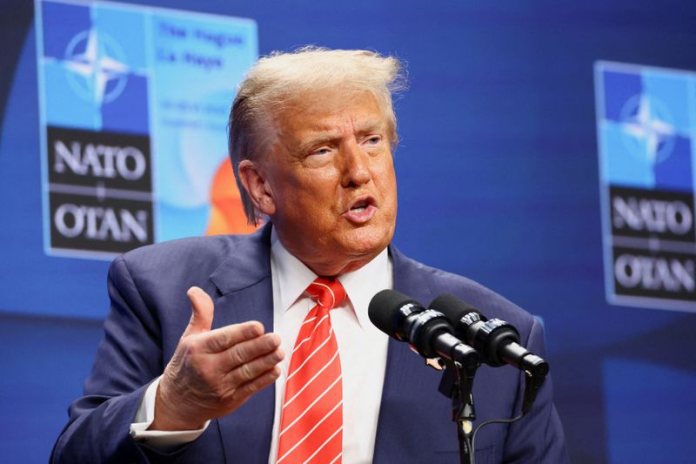US President Donald Trump confirmed nuclear negotiations with Iran will commence next week, framing the diplomatic initiative as a direct outcome of US military strikes that he claimed “obliterated” Tehran’s nuclear capabilities, according to Reuters.
Speaking at a NATO summit in The Hague, Trump asserted the talks would seek a commitment from Iran to end its “nuclear ambitions,” though he dismissed their necessity.
We’re going to talk to them next week, with Iran. We may sign an agreement. I don’t know. To me, I don’t think it’s that necessary.
The announcement follows intense disputes within US intelligence agencies regarding the effectiveness of Sunday’s strikes. While Trump insisted the bunker-buster bomb attacks caused “very severe” devastation, an initial Defence Intelligence Agency (DIA) assessment concluded Iran’s nuclear programme was set back only “by months.”
CIA Director John Ratcliffe later countered that several key Iranian facilities were destroyed and would have to be rebuilt over the course of years. Israel’s nuclear agency supported the administration’s stance, claiming the strikes set back Iran’s weapons capability “by many years.”
UN nuclear chief Rafael Grossi dismissed temporal assessments as reductive. He prioritised reinstating IAEA inspectors to verify damage, a step Iran has yet to permit
In any case, the technological knowledge is there and the industrial capacity is there. That, no one can deny. So we need to work together with them.
Regional fallout
The strikes culminated a 12-day conflict ignited by Israel’s 13 June attack on Iranian nuclear and military sites. Iranian authorities reported 627 killed and nearly 5,000 injured, while Israel confirmed 28 fatalities from Iranian missile barrages.
Civilian trauma permeated both nations: Tehran residents described “intense” bombardments leaving them “completely defenceless,” whilst Israeli survivors in Beersheba recounted missile impacts tearing through apartments.
Iran’s government responded with domestic crackdowns, executing three alleged Mossad collaborators and arresting 700 individuals accused of ties to Israeli spy networks. President Masoud Pezeshkian suggested the crisis could catalyse reform.
Trump notably abandoned earlier calls for a change in Iran’s government, stating:
No… If there was, there was. I’d like to see everything calm down as quickly as possible. Regime change takes chaos, and ideally, we don’t want to see so much chaos, so we’ll see how it does.
The ceasefire remains fragile, with both sides initially violating it hours after Trump’s declaration. Israel launched strikes on Tehran, prompting Trump to publicly admonish Netanyahu:
I’m not happy with them. I’m not happy with Iran, either, but I’m really unhappy with Israel going out this morning. We basically have two countries that have been fighting so long and so hard that they don’t know what the f*** they’re doing.
As Grossi prepares to engage Iranian officials, the talks’ agenda remains undefined. With regional stability hanging in the balance, next week’s discussions face scepticism from analysts who note Tehran’s trust in Washington has been eroded by multiple diplomatic betrayals.
